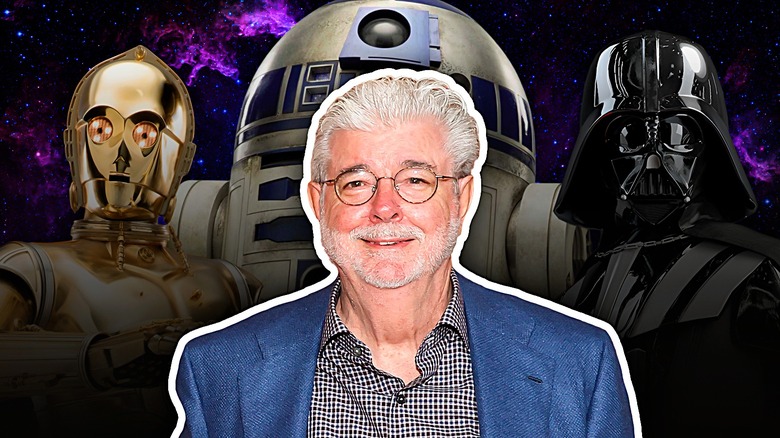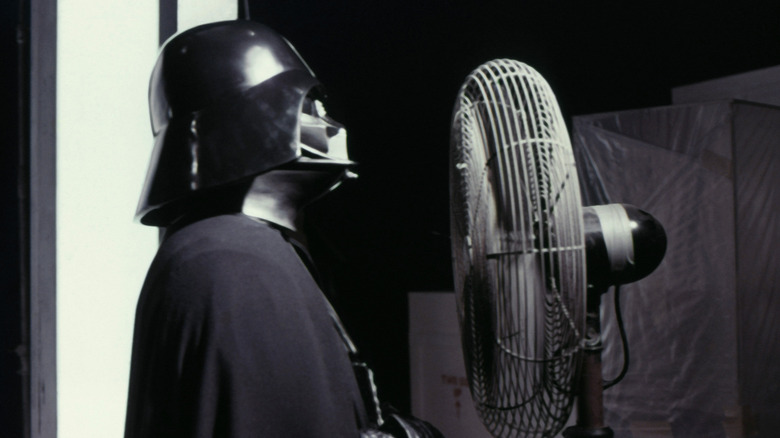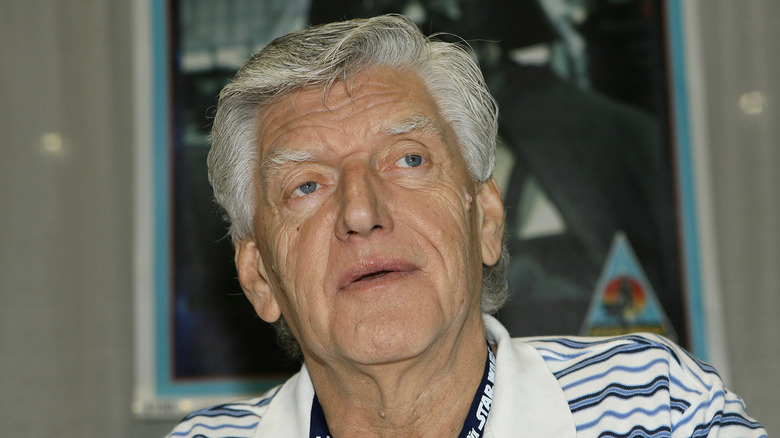George Lucas Banned One Star Wars Actor From Official Events - But Was It Justified?
It's no secret that appearing in Star Wars isn't always a blessing for actors. Some, like Mark Hamill, Harrison Ford, Carrie Fisher, and Ewan McGregor, have earned widespread acclaim and adoration through their performances. But for others, it hasn't been such a positive experience. Jake Lloyd infamously received widespread harassment for his turn as Anakin Skywalker in "The Phantom Menace," despite being only 9 at the time of filming.
Lloyd isn't the only one whose Star Wars role brought undue negativity and despicable treatment from audiences. It's a long list that includes Hayden Christensen, Ahmed Best, Kelly Marie Tran, Moses Ingram, and John Boyega. Typically, the worst of the scorn comes from the toxic epicenters of the Star Wars fandom. In the case of the late David Prowse — the actor who portrayed Darth Vader on-screen during the original trilogy — contempt came from Lucasfilm itself.
Prowse's fraught relationship with George Lucas was always complicated, to say the least. His role as the man in the suit hid him from viewers, making James Earl Jones the more recognizable Vader actor due to his iconic voice. A series of collisions with Lucas over the years and complaints of unfair treatment ultimately led to complete exclusion. In 2010, Prowse was banned from all official Star Wars fan events and conventions — here's why.
David Prowse and George Lucas butted heads numerous times
The feud between David Prowse and George Lucas can be traced back to the original Star Wars movie. During filming, Prowse delivered all of Darth Vader's lines himself. In a 2016 interview with Film Fad, he admitted that he knew his dialogue would have to be dubbed over due to the constraints of the costume, but he assumed he would be the one to do it. Instead, Lucas chose to cast James Earl Jones, which Prowse attributed to the studio not wanting to pay to fly him out to America for recording.
There are many stories of Prowse and Lucas colliding after the first film was released. The actor mentioned the possibility of Darth Vader being Luke Skywalker's father at a 1978 fan event, which took place before a script for "The Empire Strikes Back" had been properly written. Prowse later claimed it was simply speculation, but rumors hold that Lucas was very upset at the suggestion. Perhaps not coincidentally, Prowse didn't show his face in "Return of the Jedi" in the scene where Luke removes Vader's helmet. Instead, Sebastian Shaw portrayed the dying Anakin Skywalker. In an interview with Rockcellar Magazine, Prowse said this was because Shaw was a friend of Alec Guinness and needed work at the time, so the casting was essentially a favor. Still, some have theorized that Lucas had more vindictive intentions.
David Prowse's relationship with George Lucas only got worse with time
David Prowse continued to speak his truth about Star Wars for years after "Return of the Jedi." He repeatedly stated that he never received any royalties from the film due to it not turning a profit (according to Lucasfilm), despite the movie grossing nearly $500 million on a budget of just $32 million. This discrepancy is due to some tricky financial sleight-of-hand often employed by studios, which drove another wedge between Prowse and Lucas.
Prowse's ban from Lucasfilm events in 2010 was the culmination of decades of tension. Still, it's hard to see it as justified. As reported at the time by the A.V. Club, Prowse revealed the ban in a post on his official website. He said that he was unclear of the exact reason and that Lucasfilm told him he had "burnt too many bridges."
At a point when fan sentiment was largely anti-Lucas due to dislike for the prequel trilogy, Prowse's exclusion was another arrow in the quiver fans built against the filmmaker. These days, Disney has become the target of that ire, and Lucas has returned to a much more widely esteemed place in the fandom. However, his treatment of Prowse remains eyebrow-raising, and the core issue isn't gone from Star Wars. With Pedro Pascal barely showing up on set for "The Mandalorian" these days, the question of proper credit for the actors behind the masks is arguably more relevant than ever.


